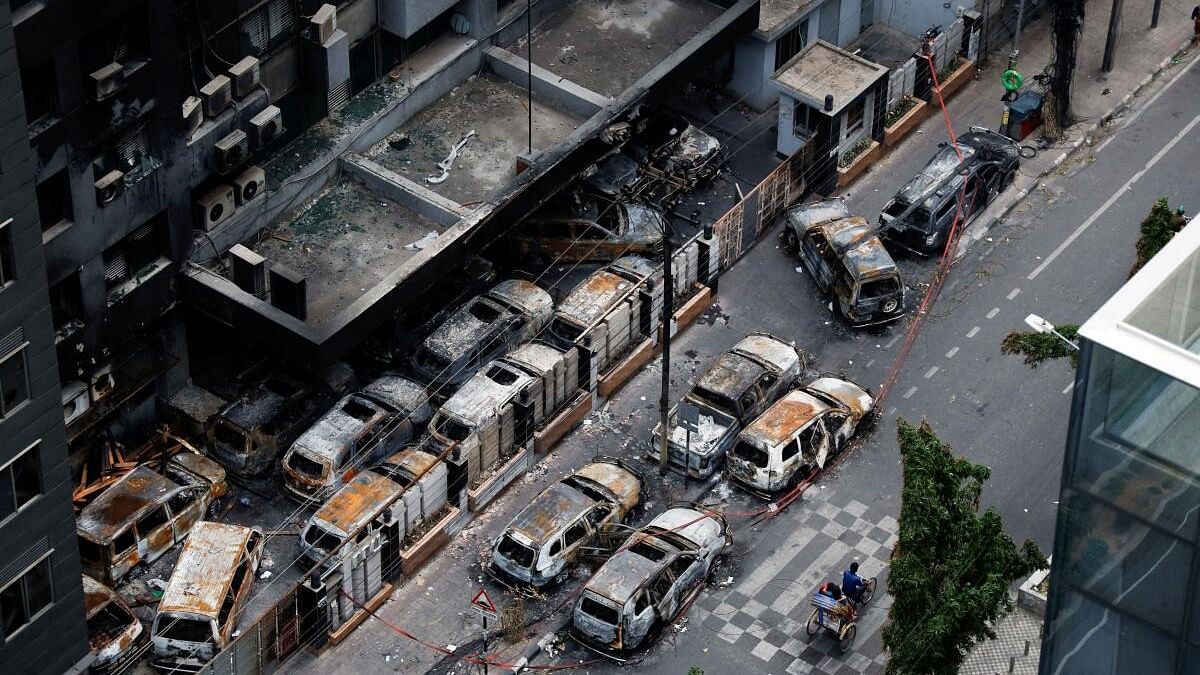
A man rides his rickshaw past damaged vehicles that were set afire by a mob during clashes after violence erupted following protests by students against government job quotas, in Dhaka, Bangladesh, July 21, 2024.
Credit: Reuters Photo
Dhaka: Bangladesh crawled back to normalcy on Wednesday after a five-day nationwide violent student protest over quotas in government jobs with rush hour traffic returning to streets in the capital, and limited reopening of banks, garment factories and internet services.
A nationwide internet blackout since last Thursday has restricted the flow of information in the country. Limited connectivity was restored on Tuesday night, with priority given to companies such as banks, technology firms and media outlets.
Mobile phones have started working, but users say the internet is slow, while mobile internet and sites such as Facebook remain suspended.
The curfew was relaxed for seven hours in the capital and in other districts too but the authorities said a strict vigil by army troops and paramilitary Border Guard Bangladesh (BGB) would continue alongside riot police and elite anti-crime Rapid Action Battalion (RAB).
The city and inter-district bus and ferry services were restored coinciding with the relaxed curfew hours.
However, schools and other educational institutions remained shut.
The violence claimed dozens of lives, including that of students, with some media tally suggesting the toll to be as high as 184. Earlier this week, the government set up a judicial investigation into the violence with a High Court judge in the chair.
The government attributed the unrest to fundamentalist Jamaat-e-Islami and their student front Chhatra Shibir, backed by former prime minister Khaleda Zia’s Bangladesh Nationalist Party (BNP) and allegedly taking advantage of the students’ movement.
The main opposition BNP rejected the charges and instead, blamed the government.
A manhunt for culprits who damaged major government installations and property like the state-run Bangladesh Television (BTV) is underway, law enforcement agencies said.
“The anti-liberation Jamaat-BNP and militants carried out the unprecedented mayhem one after another joining their hands. Never did we see attacks on police stations and jails... this is new to us,” Home Minister Asaduzzaman Khan Kamal told a press briefing at his office.
“Mobilising all our strength, we will track down every one of them and expose them to justice. We will not deviate even an inch from this mission,” he said.
Local media reports suggested that police have so far arrested over 2,500 suspected anarchists.
The apex Appellate Division of Bangladesh’s Supreme Court earlier on Sunday ordered a massive quota reform, keeping only seven per cent reserve posts instead of the existing 56 per cent.
The 1971 war veterans' quota will be cut down to 5 per cent and 2 per cent will be reserved for ethnic minorities as well as transgender and disabled people leaving 93 per cent jobs to be merit-based. The government has issued a Gazette notification in line with the order.
The student group leading the demonstrations suspended the protests with one of their leaders saying they had not wanted the reform “at the expense of so much blood.”
Meanwhile, junior minister for information and broadcasting Mohammad Ali Arafat, told another media briefing for foreign media: “We never wanted the casualties, it was very, very unfortunate and unwanted... every incident, and casualty will be independently investigated.”
He added the judicial committee will investigate “thoroughly every single thing regardless of who is involved.”
Students were furious because quotas left fewer than half of government jobs open on merit amid an unemployment crisis, particularly in the private sector, making government sector jobs with their regular wage hikes and perks especially prized.
Bangladesh's major export-earning garment and textiles industries, which supply to major Western brands reopened after days of closure due to the unrest and curfew.
“All our factories are open today. Everything is going smoothly,” Bangladesh Garment Manufacturers and Exporters Association president SM Mannan said in a statement.
Officials said the southeastern Chattagram port that was forced to suspend handling of cargoes has resumed operations as the highways were reopened to carry the containers.